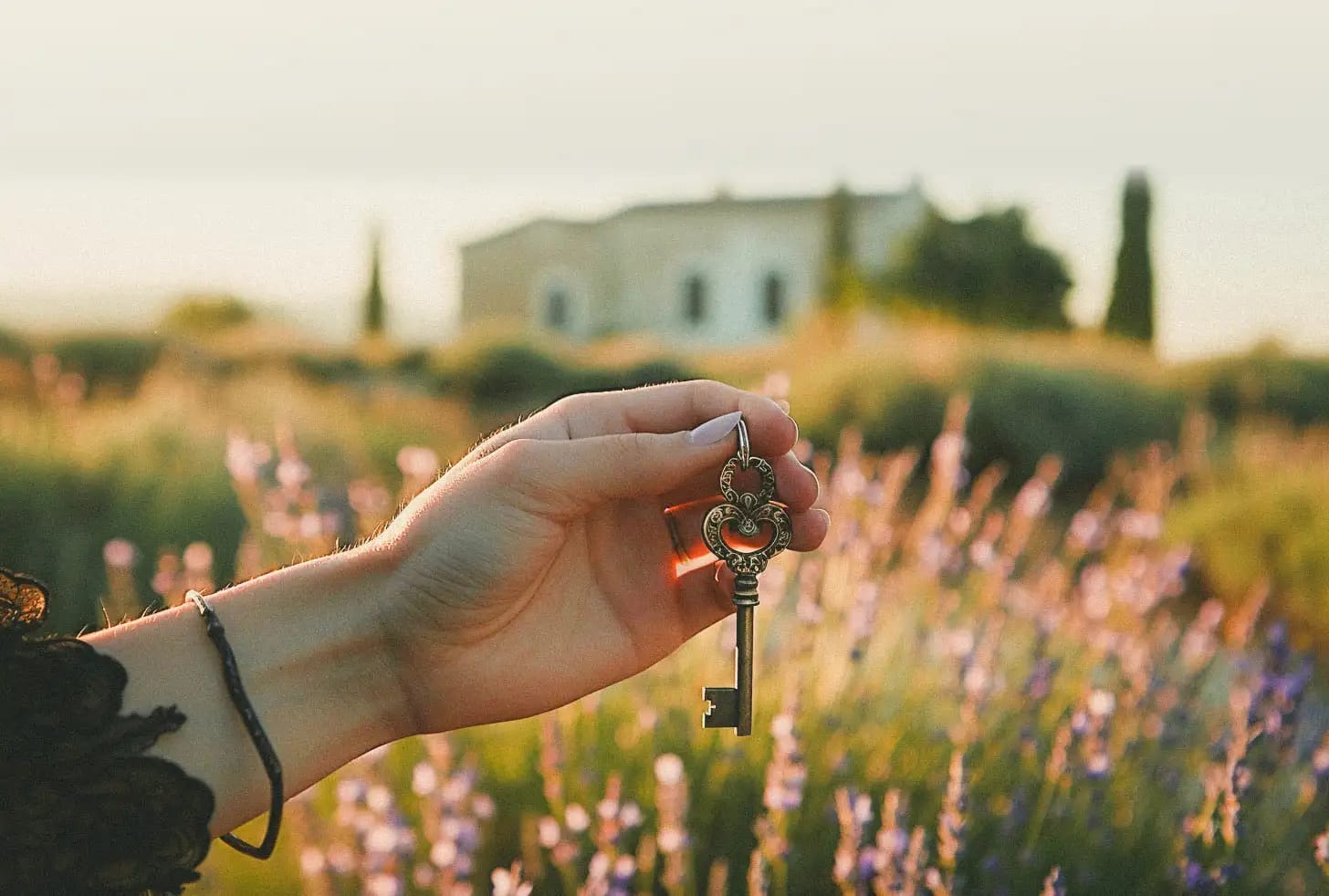Are you dreaming of a wedding that’s dappled in sunlight with a vineyard, chateau, or rustic villa as your backdrop? Then France is a great option, with so many regions, venues, and environments to choose from, the country has something for everyone.
When it comes to the legalities surrounding getting married in France, don’t worry, this can actually be very simple.
In this article we’ll walk you through French marriage laws, the civil ceremony process, and what to do as a US or UK citizen, plus local traditions and FAQs.
Let’s get struck in…
Table of Contents
Can You Get Married in France as a Foreigner?
Starting off with the obvious question, can foreigners actually get married in France? The simple answer is yes, but the complicated answer is that there are specific laws and requirements to be aware of under French marriage law.
What does this mean?
- Civil Ceremony is Mandatory for Legal Recognition
Only a civil marriage (mariage civil) performed at a French mairie (town hall) is legally valid in France. Religious or symbolic ceremonies are optional and do not replace this legal requirement. - Residency / Local Connection Requirement
One party must generally have some kind of connection to the commune (town) where the ceremony will take place. This can be via residence, owning or renting property, or sometimes via family ties. Proof of domicile (proof of address) is usually required.
Also, many municipalities require that this residence exists for a minimum period prior to the wedding (often around 30 days) before submitting the marriage application. - Symbolic Weddings vs Legal Weddings
For many foreign couples, the legal hurdles (residency, document translation, proof, local administrative rules) mean they legally marry in their home country, then hold a symbolic or religious ceremony in France.
This applies to everyone, regardless of citizenship.
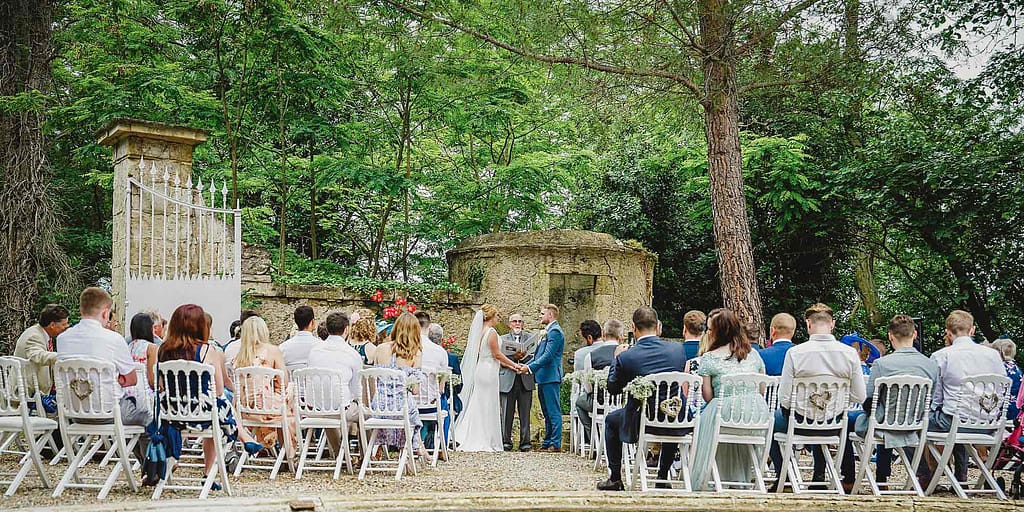
Civil Marriage in France: Legal Requirements for Foreigners
A civil marriage in France is the only legally recognised form of marriage under French marriage laws. Whether you are a foreign couple dreaming of a chateau wedding or a local resident, the marriage must take place at the mairie (town hall) in the commune where at least one partner has legal ties. Religious or symbolic ceremonies can follow, but they have no legal standing without the civil ceremony.
Can You Get Legally Married in France as a Foreigner?
Under French marriage law, at least one of the partners must meet a residency requirement: usually living in the commune for at least 30 days prior to the wedding. This rule applies whether you are French, UK, US, or from another country. Some communes also accept strong ties through family or property ownership.
Because of this, most destination couples planning a wedding in France will not qualify for a legal civil ceremony. Instead, they often sign the legal papers at the registrar of their hometown and then enjoy a symbolic or religious ceremony in France.
It’s also worth noting that same-sex marriage has been legal in France since 2013, and LGBTQ+ couples are entitled to the same rights and requirements as any other couple.
What Documents Do You Need to Get Married in France?
If you are eligible for a French civil marriage, you will need to prepare a dossier of documents well in advance. Typical requirements include:
- Valid passports or national ID cards for both parties
- Birth certificates (recently issued, often within 3–6 months, and officially translated into French)
- Certificat de célibat (certificate of single status or certificate of non-impediment)
- Proof of residence in the commune (utility bill, rental agreement, or similar)
- Names and details of witnesses (two to four adults)
- Divorce decree or death certificate of a previous spouse, if applicable
Because many documents must be translated into French and sometimes legalised or apostilled, couples should begin the process well over six months in advance. Each mairie may also have slightly different requirements, so it is essential to contact the local town hall early in the planning process. It is also beneficial to work with a wedding planner who speaks French.
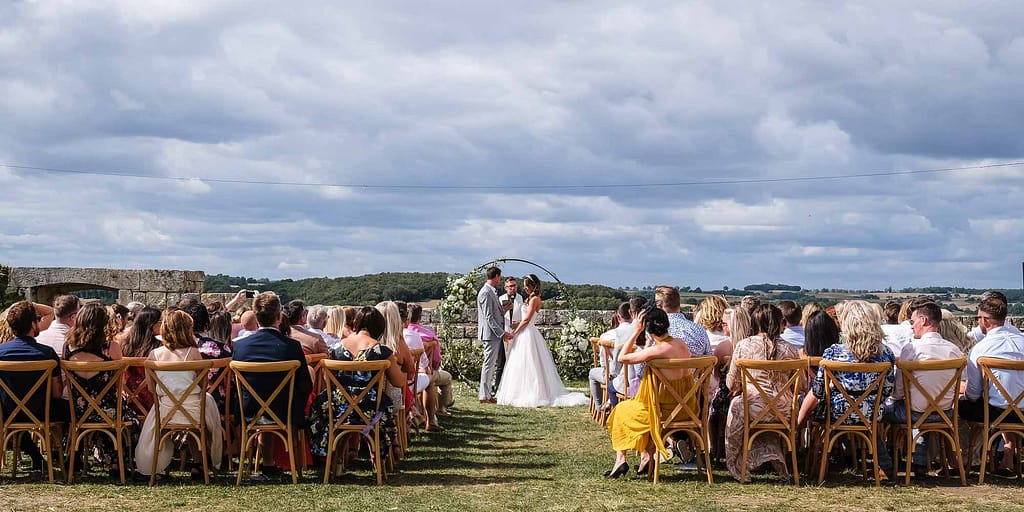
How Long Does It Take to Get Married in France Legally?
Couples often ask, “How quickly can you get married in France?” The answer depends on local administration, but there are some clear rules under French marriage law.
The most important requirement is the publication of the banns. Once your marriage application is submitted and accepted by the mairie (town hall), a notice of your upcoming marriage must be displayed publicly for at least 10 days. Only after this period can a civil wedding in France legally take place.
In practice, the full process usually takes 4–6 weeks from the time you submit all required documents to the mairie. This allows time for:
- Reviewing and approving your marriage dossier
- Translating and legalising any foreign documents (if not done already)
- Publication of the banns (10 days minimum)
- Scheduling the civil ceremony at the mairie
Remember: in France, only the civil ceremony at the mairie is legally recognised. Religious or symbolic weddings are optional and can take place afterwards, but they do not replace the civil wedding.
The table below outlines the steps you would have to take in order to get married legally in France.
| 6-12 Months Before | 3-6 Months Before | 1-2 Months Before | 10 Days Before | On the Day |
| Research whether you qualify (residency in the commune or strong family/property ties). | Gather your certificat de célibat (certificate of single status / non-impediment). | Confirm witness details and submit them to the mairie.. | The mairie publishes the banns (public notice of marriage) for 10 consecutive days. | Attend your civil ceremony at the mairie — the only legally recognised wedding in France. |
| Contact the mairie (town hall) where you plan to marry and request their list of required documents. | Prepare proof of residence (utility bills, rental contract, or property ownership). | Ensure all documents have been apostilled or legalised where required. | This must be displayed at the town hall before the ceremony can take place. | Celebrate with a symbolic or religious ceremony afterwards if you wish. |
| Order official copies of your birth certificates — they must be recent (within 3–6 months). | If divorced or widowed, obtain divorce decrees or death certificates. | Schedule the date for your civil ceremony in France. | ||
| Check translation and legalisation requirements (some documents must be translated into French and apostilled). | Choose your witnesses (two to four adults with valid ID). | |||
| Submit your preliminary dossier to the mairie for review. |
Key Takeaway – Most foreigners can’t meet France’s civil wedding requirements — the process is long and stressful. Instead, sign the papers at home and celebrate in France with a symbolic ceremony. Your guests won’t know the difference, and you’ll enjoy all the romance without the red tape.
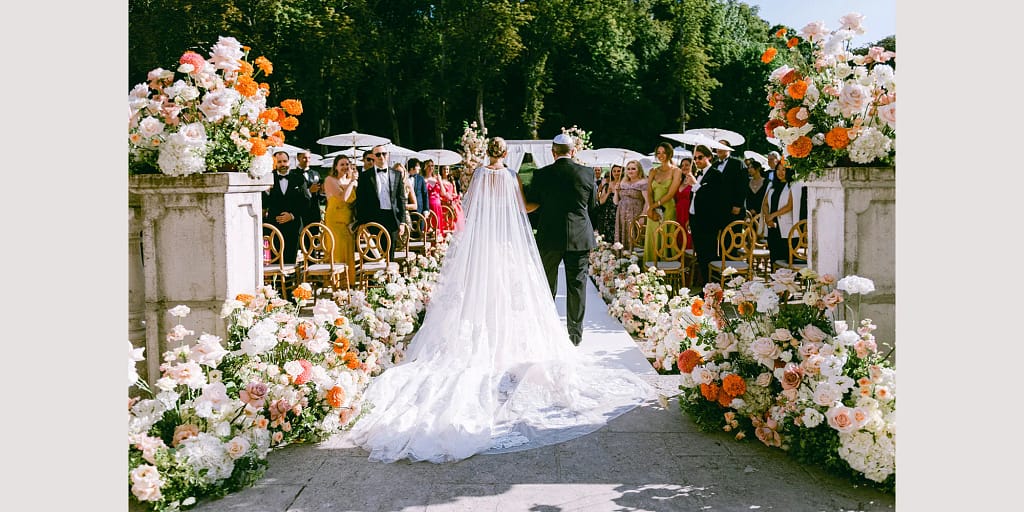
Can You Get Married in France on a Tourist Visa?
For a civil wedding in France, the rules are strict: at least one partner must be a French resident or have strong ties to the commune. This means that a tourist visa is not enough to legally marry at a mairie (town hall). The residency requirement applies regardless of whether you are from the US, UK, or elsewhere.
However, many couples do travel to France on a tourist visa for a symbolic wedding. This allows them to hold a beautiful ceremony in a chateau, vineyard, or countryside estate, surrounded by family and friends. Symbolic weddings look and feel just like official weddings — complete with vows, rings, and celebrations — even though the legal paperwork is signed back home.
For most international couples, the best approach is to complete the civil marriage at home before travelling, and then enjoy a once-in-a-lifetime symbolic wedding in France.

Symbolic Weddings in France: The Most Popular Option for Foreigners
For most international couples, the easiest and most romantic choice is to plan a symbolic wedding ceremony in France. Unlike a civil wedding, a French ceremony held at a chateau, vineyard, or countryside estate doesn’t require residency, lengthy paperwork, or official approvals.
This route is especially popular with American and British couples who complete the legal paperwork at home, then celebrate their wedding ceremony in France with all the beauty, tradition, and atmosphere they’ve dreamed of. Guests will experience the day exactly as they would an official wedding — vows, rings, champagne toasts, and dancing into the night.
Thinking of planning your own wedding ceremony in France? Explore our guide:
Eloping in France: Is It Possible for Foreigners?
Yes — you can absolutely elope in France as a foreigner. While a legal civil wedding requires residency, symbolic elopements in France have no such restrictions. That means you can escape to Provence, Bordeaux, or even Paris, and exchange vows in a private, intimate setting without worrying about administrative rules.
For many couples from the US and UK, eloping in France offers the best of both worlds: a private celebration in one of the world’s most romantic destinations, paired with a simple legal signing back home. Whether it’s just the two of you or a handful of close friends, eloping in France creates unforgettable memories in a dreamlike setting.
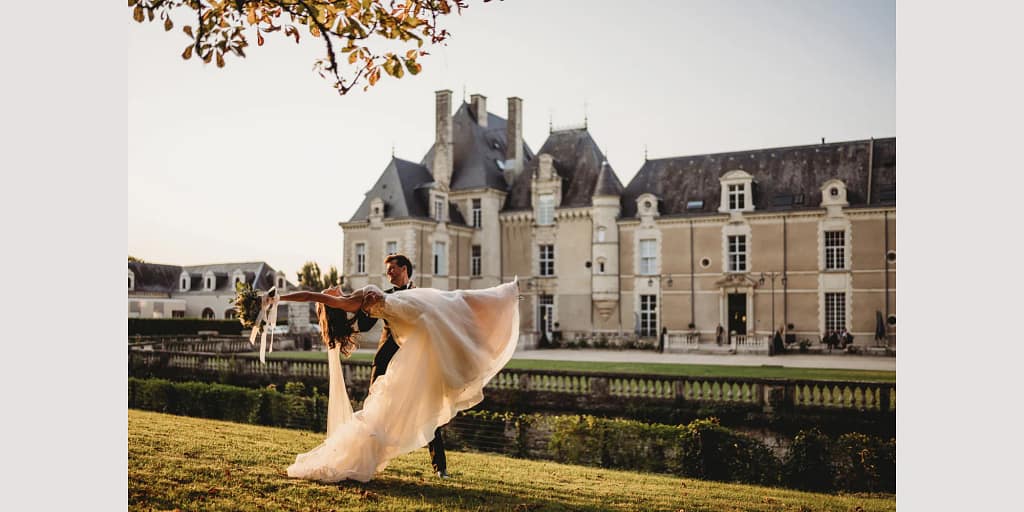
LGBTQ+ Weddings in France
Same-sex marriage in France has been legal since 2013, making it one of the earlier European countries to recognise marriage equality. This means that LGBTQ+ couples follow the same civil marriage requirements in France as any other couple — whether for a civil ceremony at the mairie or a symbolic celebration at a chateau or vineyard.
For couples who don’t meet the residency requirement for a legal gay marriage in France, the most popular option is to complete the paperwork at home and then host a symbolic LGBTQ+ wedding in France. These ceremonies are every bit as meaningful, and guests will experience them as a full wedding day.
At Chateau Bee, we are committed to showcasing inclusive venues that warmly welcome LGBTQ+ couples. Whether you’re planning a grand chateau wedding or an intimate vineyard elopement, you’ll find spaces across France where love in all its forms is celebrated.
Take a look at these inclusive venues:
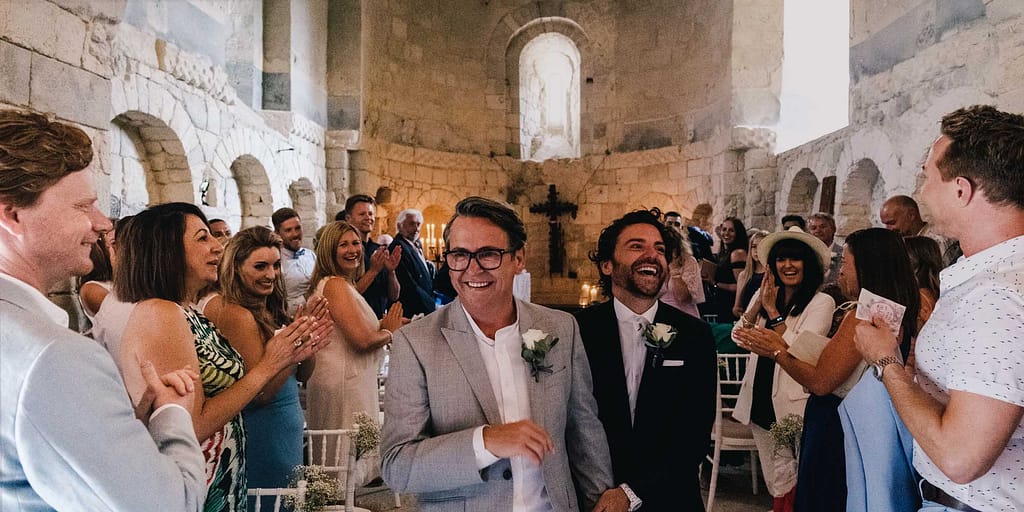
Getting Married in France as a US Citizen
Dreaming of a chateau wedding in France is common for American couples — but when it comes to the legal side, most soon discover that getting married in France as an American isn’t straightforward.
Because French law requires at least one partner to be a resident in the commune, the majority of US couples choose to have a quick legal marriage in the US first, then travel to France for a symbolic wedding. This allows them to enjoy a celebration that looks and feels like the real thing, without the paperwork headaches.
If you do qualify for a French civil marriage, it is legally valid in the US — but only if you take a few important steps. You’ll need to:
- Obtain an apostille (a type of international certification) for your French marriage certificate.
- Have the document officially translated into English by a certified translator.
- Register the marriage with US authorities if required by your state.
Many Americans overlook these steps and assume their French marriage is automatically legal in the US, but without the apostille and translation, it may not be recognised when you need it (for passports, taxes, or legal name changes).
Tip: To avoid pitfalls, couples should always check with both the mairie where they plan to marry in France and their local US consulate before making plans. For most, however, the smoother path is to sign the papers at home and let France be the backdrop to the symbolic celebration.
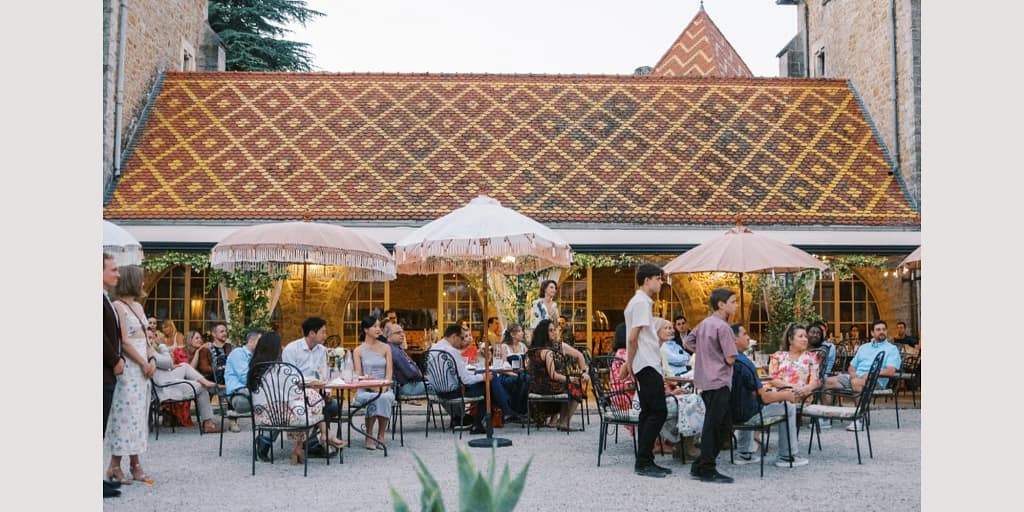
Getting Married in France as a UK Citizen
For British couples, the process of a legal wedding in France is almost identical to that of US citizens. While it is technically possible for a UK citizen to get married in France, French marriage law requires that at least one partner is resident in the commune where the marriage will take place. Without this residency, you cannot hold a legally binding civil ceremony at the mairie.
If you do qualify, you’ll need to obtain a Certificate of No Impediment (CNI) from your local UK registrar before marrying in France. This document confirms that you are legally free to marry and may need to be translated into French and legalised for use by the French authorities. Other requirements, such as recent birth certificates and proof of residence, also apply.
Because of these restrictions, most UK citizens planning a marriage in France choose the more practical option: a simple legal signing at home in the UK, followed by a symbolic wedding at a chateau, vineyard, or countryside estate in France. This way, the celebration feels every bit like the real wedding, without the paperwork challenges.
What If You’re From Another Country?
Couples from outside the US and UK — such as Australians, Canadians, or Irish citizens — face the same restrictions under French marriage laws. Unless one partner is resident in France, you won’t be able to have a legally binding civil wedding at the mairie.
The simplest and most popular route is to complete the legal paperwork at home, then hold a symbolic wedding in France. This way, you enjoy all the romance of a French chateau or vineyard ceremony without the red tape.
For official guidance, always check your embassy or consulate. Here are some useful starting points:
| Country | Embassy Guidance Link | Notes |
| Australia | Australia – Getting Married in France | Australians can marry in France if residency rules are met; otherwise symbolic wedding recommended. |
| Canada | Canada – Getting Married Abroad | Canadian citizens need a Statement in Lieu of Certificate of Non-Impediment. |
| Ireland | Ireland – Getting Married Abroad | Irish citizens must apply for a Certificate of Freedom to Marry. |
| Other countries | Check your local embassy in France | Requirements vary; translations and legalisation of documents almost always required. |
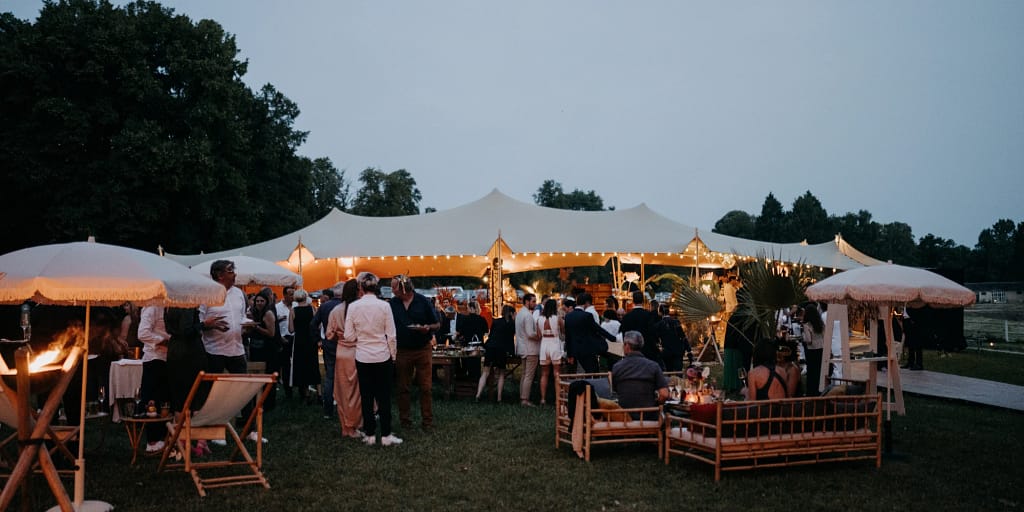
French Wedding Culture: A Brief Glimpse
When it comes to French marriage culture, weddings are as much about style as they are about celebration. A typical marriage ceremony in France is chic and elegant, often followed by long receptions that stretch late into the night with fine wine, gourmet dining, and dancing. Many couples also embrace the French tradition of multi-day events, turning the wedding into a weekend or even week-long gathering where friends and family enjoy the beauty, food, and culture of France together.
- Civil ceremony at the mairie — the legally required step before any religious or symbolic celebration.
- Vin d’honneur — a drinks reception with champagne and canapés between the ceremony and dinner.
- Croquembouche — a towering dessert made of profiteroles bound with caramel, often replacing the wedding cake.
- Multi-course feast — French weddings feature long, indulgent dinners with regional wines and gourmet dishes.
- La soirée dansante — dancing late into the night, often with live music or a DJ.
- Multi-day celebrations — many weddings in France last two or three days, with welcome dinners and farewell brunches.
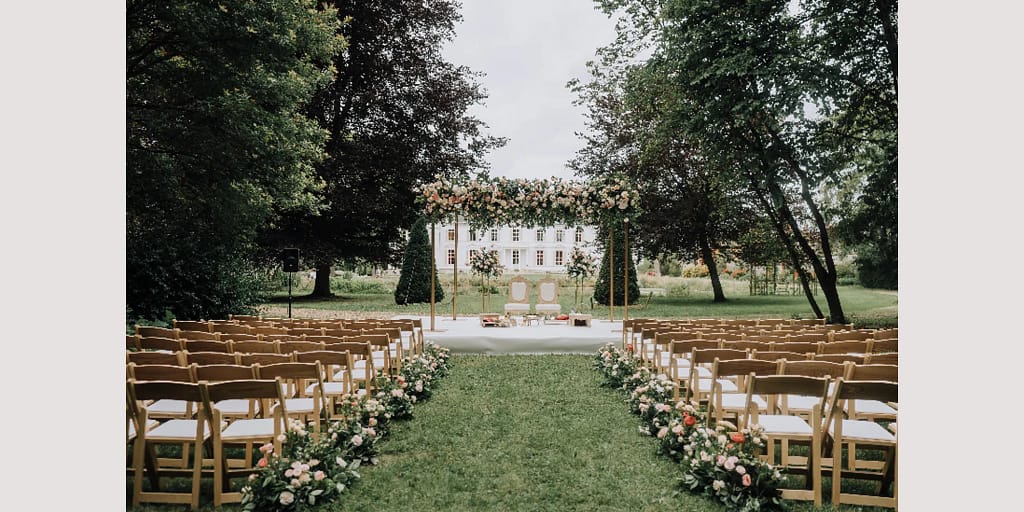
FAQs About Getting Married in France
Can tourists legally marry in France?
No. Tourists cannot have a legally binding civil wedding in France unless one partner meets residency requirements in the commune. However, couples on a tourist visa can hold a symbolic ceremony at a chateau, vineyard, or estate.
Can two foreigners get married in France?
Yes, but at least one of the partners must be a French resident or have strong local ties. Without this, two foreigners cannot legally marry in France, but they can have a symbolic wedding.
Is a French marriage legal in the US/UK?
Yes, a civil marriage in France is legally valid in both the US and UK. To be recognised, couples must obtain an apostille and a certified translation of their French marriage certificate.
How much does a symbolic wedding cost in France?
Costs vary widely depending on the venue and guest list. A symbolic wedding in France can start at around €5,000 for a small elopement and rise to €50,000+ for a chateau celebration with catering, décor, and entertainment.
What is the easiest way to marry in France as a foreigner?
The simplest route is to legally marry at home, then host a symbolic wedding in France. This avoids residency restrictions while giving you the celebration you’ve dreamed of.
Can LGBTQ+ couples get married in France?
Yes. Same-sex marriage has been legal in France since 2013. LGBTQ+ couples face the same civil requirements as any other couple and can also opt for symbolic weddings.
What if we want to elope?
Eloping in France is very popular among foreign couples. While you can’t have a civil marriage without residency, symbolic elopements are allowed anywhere — from vineyards in Bordeaux to a Provence Chateau.
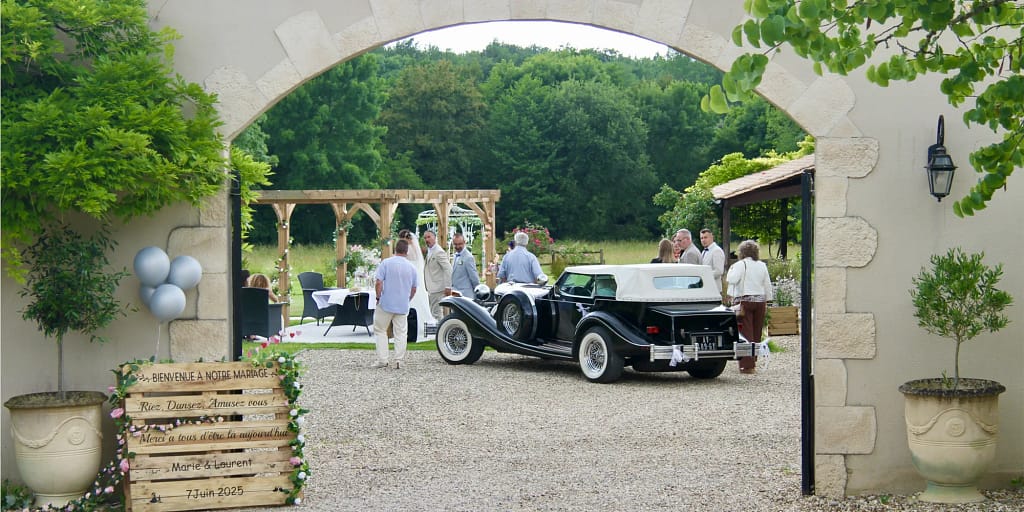
Plan Your Dream Wedding in France With Chateau Bee
Planning a wedding abroad can feel overwhelming — but with Chateau Bee, it doesn’t have to be. We’ve done the hard work for you, curating a trusted collection of French wedding venues, experienced celebrants, and expert planners who understand the unique needs of international couples.
To make things even smoother, we also connect you with our trusted affiliates — from Wise for easy international transfers, to Booking.com for guest accommodation, and WedInsure for peace of mind. Every detail is designed to take the stress out of planning so you can focus on what really matters: celebrating your love in France.
Explore our handpicked venues or get in touch today to start planning your dream French wedding with confidence.
How to Get Married in France as a Foreigner: Laws, Ceremonies & What You Need to Know (2025 Update) by Olivia


